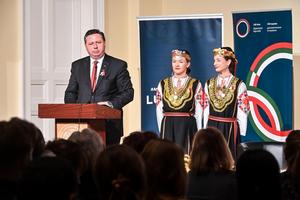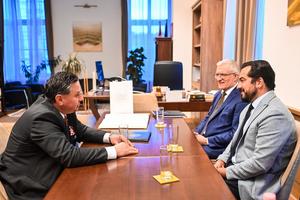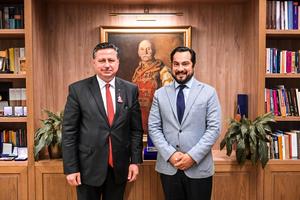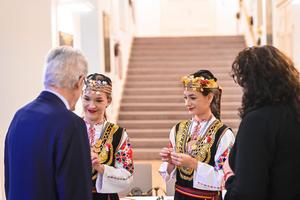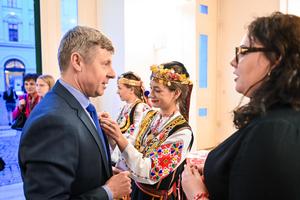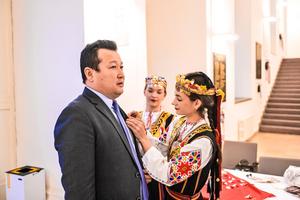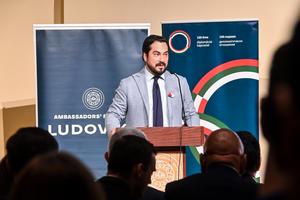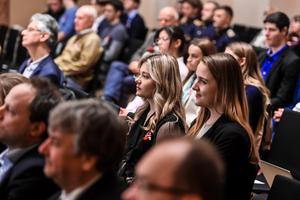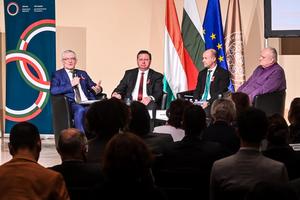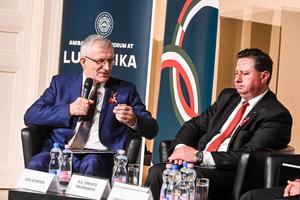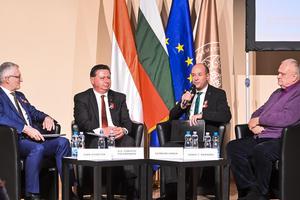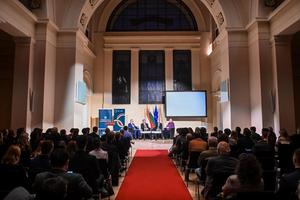Historical events, the Danube, but also religious and cultural traditions connect our country with Bulgaria, which also counts on our help during the Hungarian EU presidency in the issue of full membership of Schengen - it was said at the next event of the traditional Ludovika Ambassadors’ Forum at the Ludovika University of Public Service (LUPS).
On the occasion of the Bulgarian national holiday, the Liberation Day, the Regional Cooperation Department of LUPS and the Embassy of the Republic of Bulgaria in Hungary organized the forum on March 4, in Ludovika Main Building, under the title Bulgaria and Hungary - a thousand years of togetherness, connectivity and security in the Chapel of St. Ladislaus.
Pier Paolo Pigozzi, the international vice-rector of LUPS, emphasized in his welcome that the university's main strategic goal is to develop its international partnerships - among other things, so that students can gain insight into the events shaping the world. Reviewing the relationship between Hungary and Bulgaria, he also spoke about the fact that LUPS maintains mutually beneficial relations with Bulgarian universities, thus currently hosting Bulgarian students on its campus.
After the greeting, His Excellency Christo Polendakov, Ambassador of Bulgaria to Hungary, delivered his keynote speech. In it, he said, the relationship between the two countries is based on the heritage of common geography, religion and culture, which was shaped by natural cataclysms and historical events. Among these, he singled out plague epidemics and wars. He added that after the world wars, both countries faced the consequences of defeat, new borders and the communist regime. Even after the regime change, we set the same goal - to increase our prosperity and security - to successfully join the European Union and NATO.
The ambassador's presentation was followed by a round table discussion, in which Szimeon Varga, the Bulgarian Nationality Advocate of the Hungarian National Assembly and János T. Barabás, senior analyst of the Hungarian Foreign Affairs Institute participated. The discussion was moderated by Iván Gyurcsík, rector's advisor for regional cooperation. First of all, he was curious about the life of the Bulgarians living in Hungary, so Szimeon Varga briefly presented their history and daily life. It has been said that with the joint support of the Bulgarian and Hungarian governments, a new Bulgarian municipal, educational and cultural centre will soon be completed in Budapest, next to the Bulgarian Orthodox Church.
In connection with the issue of energy security and the Russian-Ukrainian war, the ambassador confirmed the position of his country, according to which Bulgaria is convinced that peace must be concluded as soon as possible. The future of generations is destroyed in the war, which affects not only the warring parties, but everyone. János T. Barabás explained in relation to the topic that energy and security policy go hand in hand. The region's interdependencies can be alleviated through joint cooperation. He added that the cooperation between the two countries in securing the borders goes back to the nineties.
At the moment, Bulgaria is the EU member state suffering the most significant and fastest population decline, it was said at the forum. Although the financial incentives for young people cannot be neglected, it is primarily necessary to significantly increase the quality of life in the country, said the ambassador. If this is achieved and the word spreads, many hundreds of thousands of people may return home or choose Bulgaria as their second country. The Bulgarians today subordinate all their strategic goals to the well-being of the next generations, which is one of the reasons why they count on our country's help during the Hungarian EU presidency in the matter of full membership of Schengen and eurozone accession.
Text: Tibor Sarnyai
Photo: Dénes Szilágyi
